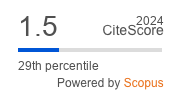How Ready for HCI? A Qualitative Analysis of the Practice of Soft Skills Related to HCI by Women Involved in the Digital Girls Program Partners Projects
DOI:
https://doi.org/10.5753/jis.2024.3852Keywords:
Digital Girls Program, Survey, Soft Skills, Computer Science, Human-Computer InteractionAbstract
The Digital Girls Program (DGP) partner projects undertake various activities that impact their members’ academic and professional development. In this context, socio-emotional skills or soft skills can be highlighted. This article is an extension of research investigating evidence of soft skills in experiences reported by female students and coordinators participating in DGP partner projects. In the original research, soft skills relevant to Computer Science were investigated. This extension, in turn, explores soft skills specific to Human-Computer Interaction (HCI). For data collection, a survey was conducted with DGP partner projects. The data analysis method employed was qualitative analysis, based on coding procedures to identify evidence of soft skills in respondents’ narratives. The actions promoted by partner projects were mapped to characterize the participating projects in the survey. As a result, leadership, professionalism, and communication were identified and are related to Computer Science and HCI. Specifically regarding HCI, evidence of critical thinking, empathy, and collaboration was identified. Thus, it is observed that women participating in partner projects develop soft skills relevant to HCI, which is a positive factor for their involvement in this field.
Downloads
References
ABES (2022). Dados do setor. [link] Accessed: 28 May 2023.
Barbosa, S. and Silva, B. (2010). Interação Humano-Computador. Elsevier Brasil.
Brasscom (2021). Estudo da brasscom aponta demanda de 797 mil profissionais de tecnologia até 2025. [link] Accessed: 28 May 2023.
Braun, V. and Clarke, V. (2006). Using thematic analysisin psychology. Qualitative Research in Psychology, 3:77–101. DOI: https://doi.org/10.1191/1478088706qp063oa.
Desidério, S., Lelis, M., Rodrigues, M., Santos, F., and Marques, A. (2023). Investigando o desenvolvimento de soft skills em projetos parceiros do programa meninas digitais: um estudo exploratório. In Anais do XVII Women in Information Technology, pages 171–181, Porto Alegre, RS, Brasil. SBC. DOI: https://doi.org/10.5753/wit.2023.230545.
Ganci, A. and Lahey, M. (2017). Uncovering the importance of soft skills in user interface design-related fields. Communication Design, 5(1-2):5–20. DOI: https://doi.org/10.1080/20557132.2017.1398924.
Lelis, M. R. L., Rodrigues, M. E., da Paz, R., and Marques, A. B. (2023). Atuação nos projetos parceiros do programa meninas digitais e seu impacto no desenvolvimento acadêmico e profissional de alunas: um survey. Anais do Computer on the Beach, 14:109–116. DOI: https://doi.org/10.14210/cotb.v14.p109-116.
Maciel, C., Bim, S. A., and da Silva Figueiredo, K. (2018). Digital girls program - disseminating computer science to girls in brazil. In 2018 IEEE/ACM 1st International Workshop on Gender Equality in Software Engineering (GE), pages 29–32. DOI: https://doi.org/10.1145/3195570.3195574.
Marques, A., Ferreira, B., Lopes, A., and Silva, W. (2020). Stimulating the development of soft skills in software engineering education through design thinking. In Anais do XXXIV Simpósio Brasileiro de Engenharia de Software, Porto Alegre, RS, Brasil. SBC. DOI: https://doi.org/10.1145/3422392.3422488.
Marques, A., Pinheiro, V., Alencar, A., Branco, K., Alves, R., and Mendes, M. (2019). Unindo pesquisa e extensão para fortalecer a participação feminina em cursos de computação de uma universidade: projeto meninas digitais do vale. In Anais do XIII Women in Information Technology, pages 31–40, Porto Alegre, RS, Brasil. SBC. DOI: https://doi.org/10.5753/wit.2019.6710.
Nascimento, L., Lima, Y., Barbosa, C., Costa, L., Santos, ., Galeno, L., Xexéo, G., and Souza, J. (2023). Paridade de gênero no ensino superior em stem no brasil: uma análise de 10 anos. In Anais do XVII Women in Information Technology, pages 217–227, Porto Alegre, RS, Brasil. SBC. DOI: https://doi.org/10.5753/wit.2023.229472.
Passos, A., Barreto, A., Nascimento, B., Silva, F., Costa, G., Costa, Y., Viana, D., and Rivero, L. (2021). O impacto das atividades do grupo pet no aprimoramento de soft skills requeridos pelo mercado de computação do maranhão: Uma análise da visão dos discentes. In Anais do XXIX Workshop sobre Educação em Computação, pages 388–397, Porto Alegre, RS, Brasil. SBC. DOI: https://doi.org/10.5753/wei.2021.15930.
Rabelo, D., Lopes, A., Mendes, W., de Souza, C., Gama, K., Monteiro, D., and Pinto, G. (2022). The role of non-technical skills in the software development market. In Proceedings of the XXXVI Brazilian Symposium on Software Engineering, SBES ’22, page 31–40, New York, NY, USA. Association for Computing Machinery. DOI: https://doi.org/10.1145/3555228.3555254.
Rodrigues, M., Maia, A., Rocha, M., Oliveira, L., and Marques, A. (2022). Desenvolvimento de soft skills durante a atuação no projeto meninas digitais do vale: achados de uma retrospectiva. In Anais do XVI Women in Information Technology, pages 34–44, Porto Alegre, RS, Brasil. SBC. DOI: https://doi.org/10.5753/wit.2022.222969.
Rosala, M. and Krause, R. (2019). User experience careers: What a career in ux looks like today. Nielsen Norman Group, pages 1–89.
Rose, E. J., Putnam, C., and MacDonald, C. M. (2020). Preparing future ux professionals: Human skills, technical skills, and dispositions. In Proceedings of the 38th ACM International Conference on Design of Communication, SIGDOC ’20, New York, NY, USA. Association for Computing Machinery. DOI: https://doi.org/10.1145/3380851.3416774.
Seagull, D. G. and Souza, G. G. P. (2023). Análise das matrizes curriculares dos cursos superiores de ciência da computação sobre a ótica das soft skills: uma análise comparativa. 14p. Trabalho de Conclusão de Curso, Faculdade de Computação e Informática (FCI), Universidade Presbiteriana Mackenzie. [link] Accessed: 20 April 2024.
Downloads
Published
How to Cite
Issue
Section
License
Copyright (c) 2024 Sofia Bento Desidério, Maria Rebecca Lopes Lelis, Maria Elanne Rodrigues, Anna Beatriz Marques

This work is licensed under a Creative Commons Attribution 4.0 International License.
JIS is free of charge for authors and readers, and all papers published by JIS follow the Creative Commons Attribution 4.0 International (CC BY 4.0) license.








